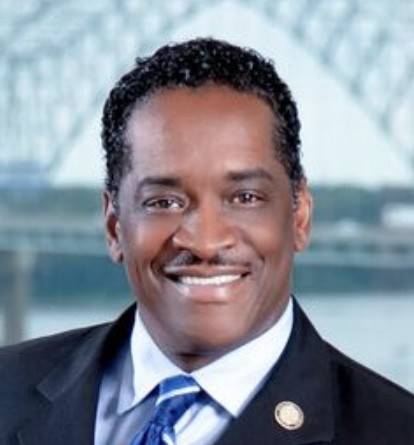It is the City Council that grabs most of the headlines and TV attention, but it must be remembered that the Shelby County Commission not only represents more constitutionally ordained authority than does the Council, it is the body that ultimately calls the shots on such important aspects of our collective life as public education and public health.

Eddie Jones
Not that the Commission controls the public schools; it just pays for them on behalf of the taxpayers. It can’t dictate on matters of curriculum — those are entirely to be worked out between the School Board and the superintendent’s office — but the Commissioners can, if they choose, withhold funding for the schools if they don’t like the drift of things.
Once in a while, in the heat of debate on the Commission, action of that sort gets threatened. One of the most persistent critics of the Shelby County Schools system is current County Commissioner Edmund Ford Jr., an educator himself and one who, in particular, is forever suspicious of S.C.S. spending plans and demands to see the fine print and the bottom line regarding virtually everything representatives of the school system bring to the Commission to get funded.
And now the Commission, which already is responsible for monitoring the county Health Department, is — in the crush of the ongoing pandemic — attempting to ground its authority even deeper, with the proposed creation of a Shelby County Health Board. The recent proposal to do so, which seemed at first to be uncontroversial, has become anything but.
Two key members of the Commission, outgoing chairman Mark Billingsley and Edmund Ford Jr., withdrew their sponsorship of the enabling ordinance at Monday’s Commission meeting amid reported pressure from city government and suburban municipalities — both of which entities are said to view the proposed new Board as threatening to their own power concerns. “We don’t like people trying to pre-empt us. We don’t like the state to pre-empt us, and we don’t like anybody else doing it, either,” said a well-placed source in Memphis city government.
The city, of course, is the driving force behind the Memphis-Shelby County COVID-19 Task Force, though virtually everyone of importance in local medicine, not to mention representatives of all the municipalities and first-responder agencies, is a member of that sprawling body which, for all the honorific nature of its cast of characters, does hard work and holds at least two valuable public information sessions during the week.
What the Task Force does not have is the power to compel policy throughout the county, and that is what the proposed Board would have, and that is why city and suburban officials were resistant to it right away. Van Turner, the low-keyed but highly influential inner-city Democratic commissioner and former chairman, is the remaining major sponsor, and he indicates he is amenable to broadening the composition of the Board — certainly not to the dimensions of the Task Force but in ways inclusive of the concerned separate jurisdictions.
After a preliminary 7-3 vote on the Board proposition and a decision to send it back to committee, the process of compromise and overhaul has begun. As it proceeds to the point necessary for passage, the concept of the Board seems likely to become that of an advisory body rather than a prescriptive one, and, in that case, its relevance as an add-on to the Task Force may cease to be obvious.
Besides the initial aversion of Memphis and suburban officialdom to the idea of the Health Board, there was another inherent obstacle to its creation — the ever-widening gap between Mayor Lee Harris and the Commission itself. There has always been a certain tension between the two power centers of mayor and Commission. In a sense the relationship is based on a balance of power, and relations between the two have always swung pendulum-like between common purpose and rivalry.
It was the latter state that dominated things during the last two or three years of the administration of former Mayor Mark Luttrell. A jurisdictional dispute that had begun in 2015 over the amount and disposition of a county fiscal surplus would harden into long-term enmity. A pair of Repubican commissioners — Terry Roland of Millington and Heidi Shafer of East Memphis — would each serve a term as Commission chair during the crucial period and the two of them, working with each other and with a technical Democratic majority, would supervise a rebellion against the GOP mayor that would erode his authority significantly and see him, at the end of his two terms in 2018, unable or unwilling even to oversee the details of transition to the newly elected Democratic mayor, Lee Harris.
Harris came into office with an 8 to 5 Democratic majority and resolved to avoid any schism with the Commission. Yet here he is, two years later, with the Commission having seized the initiative on producing the budget — and not tenderly, either — exactly as the previous Commission had done with Luttrell at the very start of their mutual alienation.

Brandon Morrison
It is this Mayor-Commission dichotomy and not partisan bickering that had seemingly become the major determinant of disagreements in county government. Yet that may be changing, as partisanship certainly reared up as a reality in the course of Monday’s election of chair and vice chair.
The Shelby County Commission has, more than most bodies elected by partisan election, been able to enjoy cooperation across party lines — certainly more so than Congress or the state legislature in Nashville. As already noted, the case can be made that Republicans Roland and Shafer (neither of whom can be described as a moderate) provided the guidelines for group action in the previous version of the Commission, a majority-Democrat one like the present version, which lines up 8 to 5 Democratic.
Which is not to say that Shafer and Roland imposed GOP ideology; except for their efforts on behalf of a tax cut, the main Commission emphasis during that period arguably was on behalf of MWBE (Minority and Women-owned Business Enterprises). That and resistance to Nashville on matters like school vouchers.
Two Democrats — Eddie Jones and Edmund Ford Jr. — have experienced no problem working back and forth across the political aisle, in much the same manner as Jones and Justin Ford did in the previous Commission. The occasional vote on a partisan matter has often seen either or both of them voting with the body’s GOP members. Up until now, there has been no equivalent among Republicans.
That all changed on Monday, when, after a unanimous vote of all Commissioners for Jones as the body’s next chairman, East Memphis Republican Brandon Morrison joined six Democrats in a vote to make herself vice chair and defeat fellow Republican Amber Mills, a north county member who tilts significantly to the right and was the preferred candidate of the other GOP members. The significance of the vote is the bearing it is likely to have a year from now when the vice chair will presumably be in the catbird seat for the next vote for chair.
Mark Billingsley, a Republican from Germantown and the outgoing chairman, has reacted with outrage to what he sees as devious and disloyal action on the part of Morrison (whose conservative voting record, incidentally, has not been radically dissimilar from Mills’), and he declined to consider a motion from Democrat Tami Sawyer to make Morrison’s election unanimous.
While Democrats like Van Turner and Reginald Milton saw the matter as no big deal, except as a good-for-the-goose, good-for-the-gander bit of parallelism, the outgoing chair remained unappeased. Given that Billingsley himself had, during his chairmanship, clearly attempted to position himself as a conciliator of factions, his reaction could signal a sea change in future relations between the parties. All that remains to be seen.